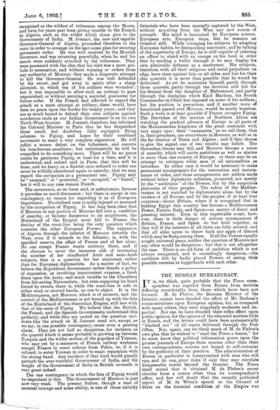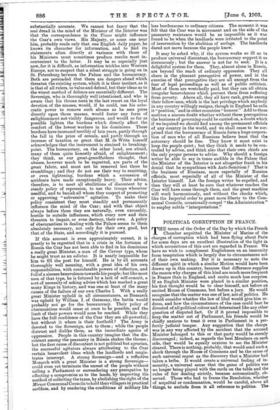THE RUSSIAN BUREAUCRACY.
IT is, we think, quite probable that the Times corre- spondent was expelled from Russia from motives differinc, considerably from those which have been put forward. M. de Plehve, the Russian Minister of the Interior, cannot have dreaded the effect of Mr. Braham's communications upon European opinion, for, as compared with many others, they were singularly moderate and im- partial. Nor can he have dreaded their reflex effect upon public opinion, for the opinion of the educated matters little in Russia, and the letters could have been systematically " blacked out " of all copies delivered through the Post Office. Nor, again, can we think much of M. de Plehve's own plea that he wished to " read the Times a lesson," for he must know that political information pours upon the greater journals of Europe from sources other than their own correspondents, sources not bound to self-restraint by the publicity of their position. The administration of Russia in particular is honeycombed with men who will run, and do run, great risks if only they may circulate disagreeable truths beyond the frontier. The Times itself stated that it obtained M. de Plehve's secret circular from a source other than its correspondent's office, and few will doubt that the recently published report of M. de Witte's speech to the Council of State on the financial condition of the Empire was substantially accurate. We cannot but fancy that the real dread in the mind of the Minister of the Interior was that the correspondence in the Times might influence the Czar's own views. His Majesty, or some one near him, probably reads only that one English daily paper, he knows its character for information, and to find its statements often directly at variance with those of his Ministers must sometimes produce results most in- convenient to the latter. It may be so especially just now, for it is difficult, as information trickles into Western Europe, not to suspect that a silent struggle is going on in St. Petersburg between the Palace and the bureaucracy. Both are persuaded that there are dangers ahead which threaten the existing system, which it is their instinct, as it is that of all rulers, to value and defend, but their ideas as to the wisest method of defence are essentially different. The Sovereign, who is thoroughly well intentioned, and who is aware that his throne rests in the last resort on the loyal devotion of the masses, would, if he could, use his auto- cratic power to remove such abuses as he sees press directly upon those masses, would foster any form of enlightenment not visibly dangerous, and would so far as possible lighten the burdens which directly affect the comfort of the lowest workers in his dominions. These burdens have increased terribly of late years, partly through the fall in the price of cereals, and partly through an increase of taxation so great that M. de Witte himself acknowledges that the instrument is strained to breaking- point. The bureaucracy, on the other hand, are afraid, many of them quite honestly afraid, of enlightenment ; they think, as our great-grandfathers thought, that abuses, however much to be regretted, are parts of the great fabric, and must not be removed lest there be crumblings ; and they do not see their way to remitting, or even lightening, burdens which a succession of accidents have made exceptionally heavy. Their advice, therefore, is to meet all ebullitions of discontent by a steady policy of repression, to use the troops whenever needful, and to banish all whom they suspect of promoting or approving " subversive " agitation. To make their policy consistent they must steadily and permanently influence the mind of the Czar; and with that object always before them they are naturally, even excusably, hostile to outside influences, which every now and then threaten to impair, or even destroy, their own. A policy of obscurantism in dealing with the Palace seems to them absolutely necessary, not only for their own good, but that of the State, and accordingly it is pursued.
If this account is even approximately correct, it is greatly to be regretted that in a crisis in the fortunes of Russia the Czar has not been able to find in his dominions a really great Minister, a man of the Cavour type, whom he might trust as an adlatus. It is nearly impossible for him to fill the post for himself. He is by all accounts thoroughly well meaning, with a great idea of his own responsibilities, with considerable powers of reflection, and full of a sincere benevolence towards his people; but like most men of that type, he is fettered by a lack of self-conceit, a sort of necessity of asking advice which has marked a great many Kings in history, and was one at least of the many causes of the failure of our own Charles I. With a really great Minister upheld in all circumstances, as Bismarck was upheld by William I. of Germany, the battle would probably not go for the bureaucracy. Their policy of obscurantism would cease at once to be possible, and the limit of their powers would soon be reached. While they have the full confidence of the Czar they are all-powerful; but without it where is their foothold ? The Army is devoted to the Sovereign, not to them ; while the people distrust and dislike them, as the immediate agents of oppression. People in this country imagine that the dis- content among the peasantry in Russia shakes the throne ; but the first cause of discontent is not political but agrarian, the successful agitators always attributing to the Czar certain benevolent ideas which the landlords and magis- trates intercept. A strong Sovereign—and a reflective Monarch with a great Minister is a strong Sovereign— could even yet terminate the unrest of the people without calling a Parliament or surrendering any prerogative by effecting a compromise as to the lands, by improving the method of collecting the taxes, by abolishing the right of the Mira or Communal Councils tohold their villagers in practical serfdom, and by rendering the conditions of military life less burdensome to ordinary citizens. The moment it was felt that the Czar was in movement and on the side of the peasantry resistance, would be as impossible as it was found to be when the landlords were irritated to the point of insurrection by the abolition of serfage. The landlords dared not move because the people knew.
It may be asked why, if the system works so ill as to produce universal discontent, the bureaucracy support it so strenuously ; but the answer is not far to seek. It is a delightful system for them. They, almost alone in Russia, are beyond the reach of ordinary oppression. They all share in the pleasant prerogative of power, and in the exercise of that prerogative they are all exempt from the fear of legal proceedings as well as of public criticism. Most of them are wretchedly paid, but they can all obtain irregular benevolences which prevent them from suffering from poverty. Above all, they all have rank, grade among their fellow-men, which is the last privilege which anybody in any country willingly resigns, though in England he calls it "position," and in other countries "honour." Add to these motives a sincere doubt whether without these prerogatives the business of governing could be carried on, a doubt which if we inquired we should find among the permanent officials of any country in the world, and we shall cease to be sur- prised that the bureaucracy of Russia form a huge corpora- tion of men who of all Russians believe least that the autocracy should be free. They know it must exist to keep the people quiet ; but they think it needs to be con trolled by advice, and think also that their own chiefs are the only proper persons to advise. Why should a foreign writer be able to say in tones audible in the Palace that the Minister of the Interior is not altogether frank in his denial that he sympathises with Anti-Semitism ? That is the hilliness of Russians, more especially of Russian officials, most especially of all of the Minister of the Interior himself. Let the foreign writer be expelled, and then they will at least be sure that whatever reaches the Czar will have come through them, and the great machine will work harmoniously, and without the checks which; like the Imperial order to grant more liberty to the Com- munal Councils, occasionally compel "the Administration" to employ subtle " interpretations.











































 Previous page
Previous page